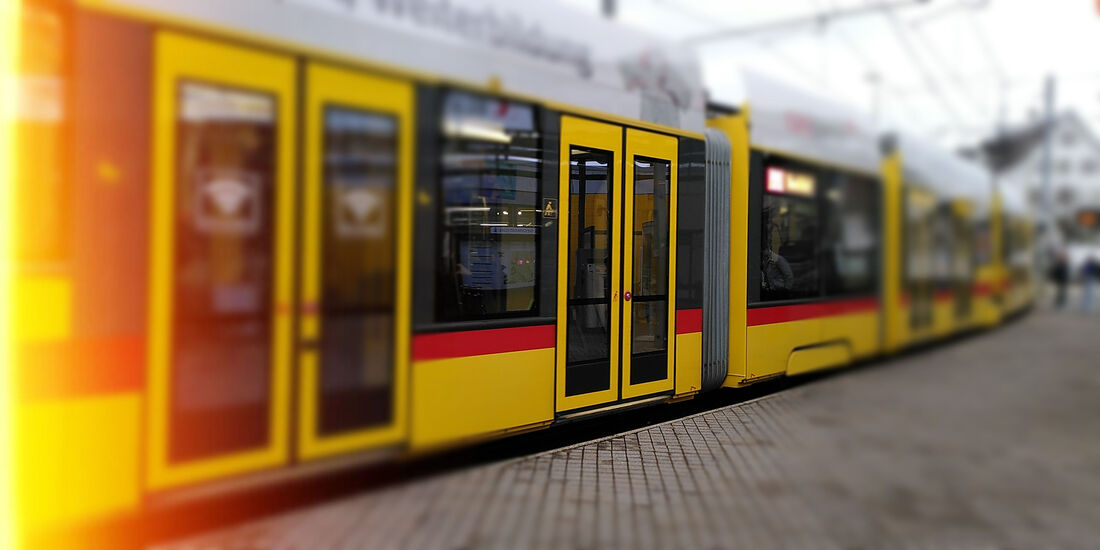Between Christmas and New Year's, I had a few days off, during which I had planned to do nothing, meaning no appointments with anyone. On one of those days, I decided to go to the thermal baths with public transportation. I walked out to the tram station and just I as I was coming close to it, I saw the tram approaching. If I had really wanted to get this tram, I would have had to make a run for it. In this split-second moment, I had to make a decision and I resolved to let it pass. I didn't run and the tram passed on without me. I realized then, that I was feeling a sense of stress; my heart was beating faster and my breath was a little caught in my chest. My conscious-self had to remind my unconscious that I had no appointment anywhere or with anyone; that I was allowed to just follow my own rhythm and could take the tram whenever I wanted.
As I sat there on the bench at the tram station waiting for the next one to come, I remembered how I used to get the bus to school every weekday morning, never knowing when the bus would come; as buses in Malaysia didn't follow schedules and sometimes they came at a regular time or they didn't. I then recalled this certain kind of anxiety that would reverberate through my body, and realized that this has not really changed, since I often times walk fast to the tram station in order that I don't miss the tram to get somewhere on time. I have gotten older and the landscape has changed, but I still feel this anxiety that I could miss appointments, especially here in Switzerland, where time defines so much of our daily lives. How I cope with this is to walk faster or come out earlier. But on this day that I had no one to meet, I could have walked slower but I did not.
This got me thinking of daily rhythms, routines and assumptions. How we humans, living in a society, take many things for granted as "normal" and often times do not bother to question how or why we do things. The neuroscientist, Beau Lotto explains:
"What your perceptual history of reality gives your brain are reflexive assumptions manifest in the functional architecture of the brain with which you perceive the here and now. These assumptions determine what we think and do, and help us to predict what to do next. It is also important to note the opposite: they also determine what we don't think and do[...] We are very lucky that our brain evolved to have assumptions [...] A set of baseline mechanical assumptions that our species developed over many, many millennia to right this very moment. This goes not just for breathing, but for sight as well. We - like other animals - are born with many assumptions (such as physical laws) already "bred" into us." (Lotto 2017: 149-150)
We evolved as a species with certain traits and reflexes, as it helped us survive to the present moment. So my being, physical, mental and possibly spiritual, wasn't just some chance occurrence, but a very experienced-defined collection of attributes shaped by millions of years of life on earth.
Before this day-off-from-my-routine that I had, I had not really bothered to become aware of my bodily sensations of stress about catching the tram on time; maybe I hadn't had the time to ponder on it, as most times I was running for the tram. What is also interesting of that moment sitting at the tram stop is the physiological response that came out of a mental state; me thinking of running for the tram had produced the same symptoms as me actually running for the tram. How remarkable is the power of my thoughts and the unconscious in shaping my reality? If I had not had time off from work, I would not have sat down on that bench to reflect on my physical body. I would have just continued on, never really becoming aware of how I have the possibility to change my experience of life.
"Seeing differently - to deviate - begins with awareness...with seeing yourself see (by no means end there). It begins with knowing that some of those invisible assumptions that maintain your survival in the past may no longer be useful. It begins with understanding that they may in fact be (or become) bad for you (and others), and if not changed would curtail living." (Lotto 2017: 185)
This practice of running-for-the-tram is not finished for me, as I believe the "trait" of punctuality is so deeply ingrained in Switzerland, that as long as I live here, I will be obliged to play along with and adapt to it. What I will do is to be aware and sometimes choose to not play along, to give myself more time and more space; to linger and sit on the tram station bench, watching the trams go by. To allow myself to experience calm in my body, even when the tram passes by without me in it.
Reference
Lotto, Beau (2017): Deviate: The Creative Power of Transforming Your Perception. London: Orion Publishing
Image by Elaine


 RSS Feed
RSS Feed